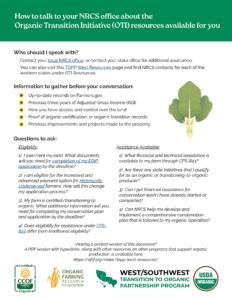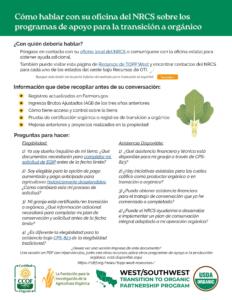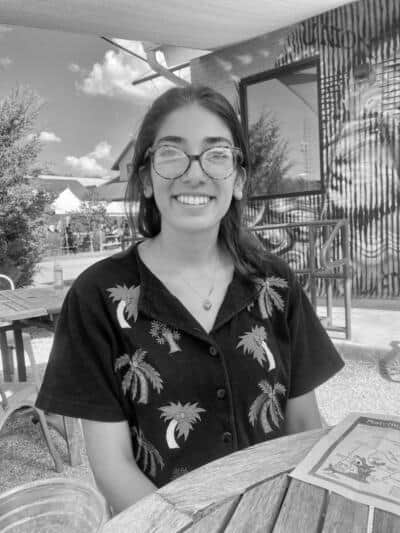Organic Transition Initiative (OTI) Deadline Announcement
Thanks to the Organic Transition Initiative (OTI), USDA’s Natural Resource Conservation Service (NRCS) has made $75M in cost-share grant funding available to certified organic and transitioning-to-organic growers under the Environmental Quality Incentives Program (EQIP) to meet the Conservation Practice Standard for Organic Management (CPS-823).
This post and the PDF below provide step-by-step instructions for contacting your local NRCS office to inquire about available financial and technical assistance programs available to you.
OFRF has developed a PDF to help farmers communicate with NRCS about accessing the Organic Transition Initiative.
It is available in both English and Spanish. >>>
Organic farmers must manage their land without prohibited inputs for 3 years for their products to be certified. This transitioning period can be incredibly challenging as farmers and their land adjust to new production practices. OTI is intended to help producers implement conservation activities required for certification, receive expert technical support, and recover foregone income due to reduced yields during the transition period through EQIP.
Important Note: Although the national deadline has been extended to March 1, 2024, states set their own ranking dates independently.
- State Deadlines:
-
- Arizona: Feb 2, 2024(General EQIP ranking date)
- California: Feb 16, 2024 (General EQIP ranking date)
- Hawaii/Pacific Islands: Mar 8, 2024
- Nevada: Mar 29, 2024 (General EQIP ranking date)
- New Mexico: Fall 2024 (General EQIP ranking date)
- Texas: Jan 26, 2024
- Utah: Mar 29, 2024 & June 28, 2024 (General EQIP ranking date)
Step 1. Research your options.
- Contacting your local NRCS office is a key step in determining your eligibility and beginning your application process. Your NRCS conservationist will help you identify which projects & practices best suit your operation.
- Check out the Conservation at Work Video Series to learn about past projects.
- Example Payment Scenarios for EQIP-Organic Initiative Project Funding
- Payment rates vary by state. Individual practice payments rates are calculated as a percentage (45 – 75%) of the typical cost of labor, materials, and equipment to implement the practice. Payments may not exceed $450,000 over a 5-year contract.
- EQIP is a reimbursement program. Historically Underserved (HU) participants are eligible for increased payment rates and advanced payments to offset the costs of purchasing goods or services. HU participants include socially disadvantaged, beginning, veteran and limited resource farmers and ranchers.
Step 2. Connect with USDA. Create or update your account at Farmers.gov, and contact your local NRCS office to get started. Your conservation specialist will confirm your eligibility and help you identify which projects & practices best suit your operation. Directing the agent to NRCS-sponsored webinars and training modules the Organic Farming Research Foundation and Oregon Tilth have developed for NRCS field agents may be helpful.
Contact your state office for additional assistance:
- Arizona: State Office, 602-280-8801, AZinfo.NRCS@usda.gov
- California: Jenna Ganoung, State EQIP Program Manager, Davis State Office, California, (530) 792-5671, jenna.ganoung@usda.gov
- Hawaii/Pacific Islands: Morri-Ann Nagata, State EQIP Program Manager, PIA State Office, 808-933-8356, morri-ann.nagata@usda.gov
- Nevada: Paulette Balliette, Resource Conservationist, (775) 857-8500, paulette.balliette@usda.gov
- New Mexico: Maggie Gnann, New Mexico EQIP Program Manager, (505) 761-4452, maggie.gnann@usda.gov
- Texas: Stacy Riley, Assistant State Conservationist for Programs, 254-742-9881, stacy.riley@usda.gov
- Utah: Davie Stokes, Program Manager (EQIP, AMA), (435) 609-9187, davie.stokes@usda.gov
Guiding Questions: Check out our “How to talk to NRCS about the OTI” PDF for additional topics, available above!
- I __own/rent__ my land. What documents will you need for completion of my EQIP application by the deadline?
- I am eligible for the increased and advanced payment option for Historically Underserved farmers. How will this change my application process?
- My farm is __certified/transitioning_ to organic. What additional information will you need for completing my conservation plan and application by the deadline?
- Can I get financial assistance for conservation work I have already started or completed?
- Can NRCS help me develop and implement a comprehensive conservation plan that is tailored to my organic operation?
- When is the deadline for the next EQIP ranking period?
Step 3. Schedule your conservation plan development. Your NRCS conservation specialist will work with you to develop a conservation plan for your operation and complete the AD 1026 form.
Step 4. Gather your application documents.
- Official tax ID (Social Security Number or Employer Identification Number)
- Adjusted gross income certification (Form CCC-941), which requires your Taxpayer ID Number and AGI from the previous 3 tax years.
- Deed, or property lease agreement and written authorization from the landowner to install structural or vegetative practices.
- Farm tract number (obtained from Farmers.gov or FSA membership).
- Documentation of organic certification (if applicable).
- Documentation of your land’s irrigation history (if applicable to project).
- Documentation of previous improvements made to the property.
Step 5. Complete your application & submit! Your NRCS conservationist will assist you in finalizing your application.
Step 6. Implement your plan. If you’re selected, you can choose whether to sign the contract for the work to be done. You’ll be provided with guidelines and a timeframe for implementing your plan. You will be reimbursed after your work is inspected and approved. Advanced payments not expended within 90 days of receipt must be returned to NRCS.
As essential stewards of the land, organic farmers deserve support. Don’t let funding be a barrier to realizing your farm’s potential. Take the first step towards growth and sustainability by applying for assistance through the Organic Transition Initiative before your state’s deadline.
Note: all of this information is available below in Spanish. Obtain additional translated materials, or schedule interpretation services for phone calls or in-person visits, https://www.farmers.gov/translations, or request personalized Spanish language support for any USDA resource, https://www.farmers.gov/translations#spanish-request.







